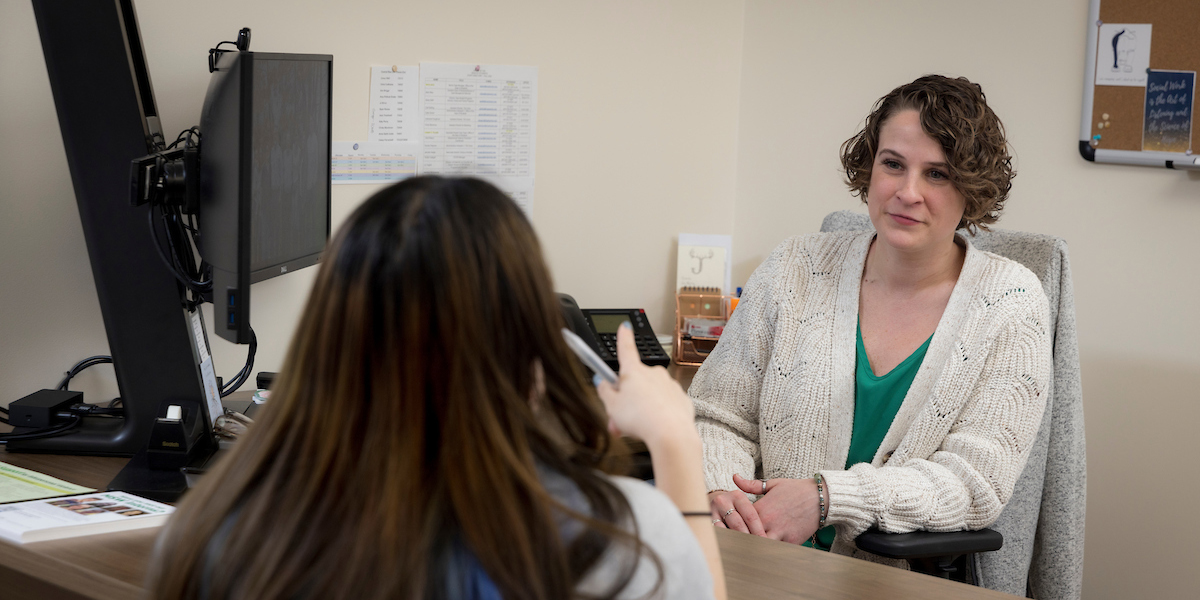New staff to bolster Binghamton University’s holistic approach to student mental health
By helping students adjust, entire campus community is more emotionally resilient

In the pursuit of academic excellence, Binghamton University recognizes the importance of fostering a supportive campus environment for its students. Central to this commitment is the University’s comprehensive approach to wellness, where a myriad of resources and services work in unison to support students. As part of this ongoing commitment to student wellness, Binghamton University is investing in new professional staff positions that will support students in Residential Life, Health and Counseling Services, the Healthy Campus Initiative, Services for Students with Disabilities and through the CARE Team.
“Binghamton University’s commitment to student mental health goes beyond the confines of individual counseling,” said Johann Fiore-Conte, associate vice president for student affairs and chief health and wellness officer. “By integrating a variety of services that meet students where they are and match the level of support needed, the University aims to create an environment where students can thrive emotionally and psychologically. More staff will help make assistance more accessible.”
The new positions are part of Binghamton’s ongoing commitment to prioritize student well-being and foster a campus culture where students have the right level of support depending on their challenges. For example, the introduction of telehealth services, in collaboration with BetterMynd, has connected students to resources more efficiently while facilitating access to diverse counselors and evening appointments.
The new investments in staffing allow Binghamton University to create more opportunities for students to access support that keeps them on track to achieve their goals.
“If a student feels like they have a sense of belonging, and they can access resources that address their well-being, they will be better prepared to bounce back from setbacks,” Fiore-Conte said. “That’s why these positions are of critical importance.”
The Residential Life Master of Social Work (MSW) intern program stands out as a unique initiative aimed at providing invaluable support to residential students. Started in August 2019, this program has seen great success, offering critical virtual services throughout the COVID-19 pandemic and receiving a SUNY Outstanding Student Affairs Program Award in 2021.
Binghamton University Residential Life is building on the program by adding a student support coordinator, who will mentor and supervise MSW graduate students who provide access to guidance and care in the residence halls.
“Through regular meetings, training sessions and feedback mechanisms, the coordinators ensure that interns are equipped to provide effective support,” Fiore-Conte said.
Ultimately, the student support coordinators play a vital role in nurturing a campus community where every student feels seen, supported and empowered to thrive.
“It’s a role that demands passion, resilience and a genuine commitment to the well-being of our diverse student body,” Fiore-Conte said.
The University Counseling Center is hiring two additional senior counselors, which will bring the University’s student-to-counselor ratio to 1:1,000 — at the low end of the range that is recommended by the International Accreditation of Counseling Services, (1:1,000 up to 1:1,500 students).
The CARE Team is adding a new position in case management and Health and Counseling Services is adding a case manager who will work with Psychiatry Services to support student mental health by coordinating care, providing support, advocating, connecting students to resources, addressing barriers to care and coordinating treatment with campus and community resources. The case manager will also provide some clinical services, such as triage, crisis intervention and brief therapy to “bridge” students to other services.
Two new mental health promotion specialist positions are being added to the Healthy Campus Initiative team. These positions will promote awareness of available services, support peer counseling and peer educator initiatives, support the mental health first-aid initiative for the campus community, and expand health education and prevention initiatives.
Finally, Services for Students with Disabilities is adding three new positions: two disability service specialists and an academic skills navigator. The disability service specialists will determine and authorize appropriate academic and programmatic accommodations for eligible students. The academic skills navigator will provide one-on-one targeted intervention with students, which may include skills related to time management and organization, study strategies, stress management, social interactions, health and wellness, role playing and social scripts, self-advocacy and daily living skills.
